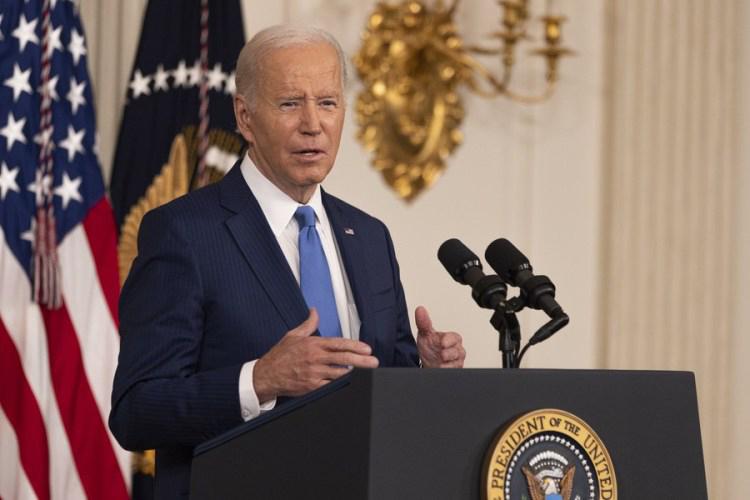
This photo taken on March 29, 2023 shows the White House in Washington, D.C., the United States. [Photo/Xinhua]
By Hafijur Rahman
When the U.S. talks peace, it means the opposite. And in the case of Sino-U.S. relations, it has long been seen every time Washington holds a high-level meeting with Beijing, it's followed with more sanctions, anti-China bloc formation, unsubstantiated accusations and subsequent demonization, or blatant provocation over Beijing's core national interests, particularly on the issue of sovereignty and territorial integrity over the Taiwan region.
China's Taiwan region is in talks with the Pentagon for $500 million in arms following delays in much-needed deliveries, said Chiu Kuo-Cheng, a high-level official in the Taiwan region. But, on Tuesday last week, the U.S. ambassador to China said that the United States is ready to hold high-level talks with China and wants to forge better bilateral communication channels, reiterating the U.S. officials' oft-cited diplomatic cliché that "Washington does not seek conflict with Beijing and believed more dialogue would be constructive." His remarks followed a flurry of seemingly conciliatory signals from high-ranking U.S. officials, from U.S. President Joe Biden to U.S. Treasury Secretary Jenet Yellen.
Over the past few weeks, the discussion about China's "aversion" to resume high-level diplomatic engagement with the U.S. that has been virtually frozen, particularly since the "balloon incident" in early February, has been the political and media narrative. Much of the discussion, containing statements from U.S. defense and state department officials, appears to obliquely pin the blame on Beijing's back for what officials have accused China of "ghosting the United States" and putting a diplomatic freeze on high-level talks with Washington.
Virtue-signaling and self-vindication
Early last month, U.S. Indo-Pacific policy coordinator Kurt Campbell said "the Chinese have been reluctant to engage in discussions around confidence building or crisis communications or hotlines." Also, State Department Counselor Derek Chollet, while talking to Singapore's Strait Times in mid-April, complained against China in a self-serving tone, saying "overtures have been made by us to have engagements with them, they have not taken up those overtures." He suggested asking Beijing why high-level diplomatic re-engagement efforts remain stalled for months.
Instead of invoking bland rhetoric and resorting to virtue-signaling efforts to vindicate itself over the current diplomatic freeze, the Biden administration should rather reflect on key policy blunders and recalibrate its China policy to mend bilateral ties. Since the souring of Sino-U.S. ties, U.S. diplomatic engagement with China has been set back with Washington's ever-present instinct of not walking the talk, what Beijing dubbed as "communicating for communication's sake."

U.S. President Joe Biden gives remarks following the 2022 midterm elections in the White House, in Washington, D.C., the United States, November 9, 2022. [Photo/Xinhua]
Talk for the talk
Much of the discussion over the cause of the current diplomatic freeze, though, has been confined to the U.S. shooting down the Chinese civilian aircraft in early February, which the U.S. alleged was a "Chinese spy balloon" without concrete evidence. But, to understand Beijing's frustration that has been brewing for months and has accumulated into Beijing's reluctance to resume the usual "talk-for-the-talk" high-level diplomatic engagement, one needs to re-examine the developments of Washington's China policy since Biden and Chinese President Xi Jinping met in their first face-to-face meeting as heads of state in Bali this past November.
The Bali meeting could have set the stage for a genuine revitalization of frayed ties, and the world expected so, at pulling relations from the brink after House Speaker Nancy Pelosi's provocative trip to the Taiwan region last August. At the meeting, Xi expressed his hope that "the U.S. side will match its words with action and abide by the one-China principle and the three joint communiques," while Biden reiterated that the U.S. government is committed to it.
Not walking the talk
Just as Chinese State Councilor and Foreign Minister Qin Gang said in a written interview with Asharq Al-Awsat on May 8, "The U.S., on its part, is exploiting the Taiwan question to contain China's development. While claiming to follow a 'one-China policy,' the U.S. has kept upgrading its official exchanges and substantive relations with the Democratic Progressive Party authorities."
Ironically, the Biden Administration has not followed through on Biden's interpretation of what he told Xi in Bali, notably on longstanding fixtures of U.S. policy toward the Taiwan region, the very political foundations of bilateral relations. Ever since the meeting in November, U.S. policy on the Taiwan region, particularly on U.S. arms sales to the island and official contacts, is the opposite of what Biden told Xi at that time.
Washington has gone beyond increasing official contacts between the U.S. and the Taiwan region. The U.S. has allowed Tsai Ing-wen's "transit visits" to the U.S. in April, a meeting with U.S. House Speaker Kevin McCarthy, a trip by the Pentagon's top China official to the Taiwan region in February, the deluge of U.S. arms to the Taiwan region, along with growing U.S. efforts to boost its offensive capability as a so-called deterrence.
There is evidently a gulf between U.S. words and actions, and a failure to match high-level diplomatic contacts with concrete outcomes. The U.S. should not, as Wang Yi, a member of the Political Bureau of the Communist Party of China (CPC) Central Committee and director of the Office of the Foreign Affairs Commission of the CPC Central Committee, warned U.S. Secretary of State Antony Blinken earlier, "pursue dialogue and cooperation while containing and stabbing China in the back." China always stands firm on dialogue and diplomacy as a means to resolve disputes and bridge gaps in relations. It is rather the U.S. that should demonstrate sincerity in prioritizing diplomacy over confrontational approaches.
Hafijur Rahman is a columnist and security and strategic analyst, working in a prominent Strategic Studies Center in Bangladesh.

 中文
中文



